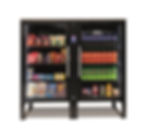Refreshment focuses on the water dispenser/cooler, office coffee service and vending sectors, while also taking an in-depth look into products for vending from bottled water and drinks, to snacks and confectionery. It also focuses on hydration, health and wellness, new technologies and environmental and social responsibility issues.
Research
Coffee & tea

Leading the charge in the new age of unattended retail, smart fridges offer convenience for customers and streamlined operations for owners. In this feature, Refreshment explores how this fast-growing technology is reshaping the way food and beverages are delivered in high-traffic, self-service environments – from office lobbies to university campuses and hospital corridors.
What is a smart fridge?
Also known as a ‘smart cooler,’ a smart fridge is, at its most basic level, a vending machine or refrigeration unit that uses technology to enhance operation and user experience.
Stocked with a wide variety of healthy, fresh and convenient choices, from grab-and-go meals to snacks and beverages, smart fridges typically accept a range of contactless payments. Once the user has selected their desired product via a touchscreen and paid using their choice of card, phone or app, the fridge door is released, allowing them to take their purchase.
Smart fridges have become the next step for vending operators and facilities managers who are aiming to provide a viable, unstaffed alternative to a restaurant or cafeteria service, but who still wish to offer more choice than a traditional vending machine. While smart fridges require a similar sized space to a traditional vending machine, they offer the additional benefit of a spacious, visually-pleasing, refrigerated storefront. This allows operators to drastically broaden their product offering, which is of particular advantage in busy or multi-use locations.

Reaping the benefits
Replacing a traditional vending machine with a smart fridge means operators do not have to choose between offering food and beverages, or between meals and snacks. Frictionless checkout, meanwhile, eliminates the need for the user to have cash on hand.
Randy Skyba, vice president of sales and marketing at Due North, a provider of refrigerated retail merchandising solutions, told Refreshment that he believes smart fridges have “redefined convenience retail by transforming static, passive refrigeration units into intelligent points of sale”. The end user gains immediate access to curated, fresh and well-stocked products, with a seamless and fast checkout experience.
“Consumers benefit from faster, frictionless transactions, often using contactless payment and mobile app access,” Skyba explained, “while operators can optimise product selection, reduce waste and increase revenue per square foot. In effect, smart coolers have become mini automated stores, opening up retail opportunities in places that were previously unfeasible due to staffing or space constraints.”
“The convenience of cashless payment, product transparency and even personalised promotions through connected apps enhances customer satisfaction and loyalty,” he continued.
Prioritising reliability and a partnership approach, Due North offers a flexible platform: its smart fridges integrate with a range of leading smart vending technologies, allowing customers to choose the software and payment ecosystem that best fits their needs.
An evolving retail landscape
According to Tanya Joustra, group marketing and communication director at vending industry stalwart Selecta, smart fridges have “significantly modernised” the landscape of automatic retail in recent years by “bridging the gap between convenience and experience”.
Joustra highlighted features like real-time inventory tracking, dynamic pricing, remote monitoring and AI-powered product recommendations, all of which help operators of smart fridges offer a seamless, 24/7 shopping experience, without the need for staff.
“This tech-forward solution meets the rising demand for fresh, premium and on-the-go products in locations previously underserved by traditional retail or vending,” Joustra explained. “Smart fridges have shifted the model from simple product dispensing to intelligent, data-driven micro-retail.”
She also noted that the ability to access nutritious or premium items on demand – without queues or fixed opening hours – enhances the customer experience and makes them more likely to return.
Ultimately, she concluded: “For the end user, smart fridges deliver convenience, speed and product quality. App integration and contactless payments give them a seamless, modern retail experience.”
Enhancing the food and beverage provision in common areas, smart fridges allow operators to offer an end-to-end service, capturing a wider segment of customers by offering them a ‘onestop shop’ for all their food and beverage needs.
Capitalising on high footfall
Smart fridges see particular success in high-footfall, semi-captive environments. When consumers cannot easily access other options, smart fridges can offer convenience, quality and range on-site.
“Smart fridges are ideally suited for high-traffic, unattended locations where traditional retail isn’t viable,” advised Due North’s Skyba. “This includes convenience stores, micro markets, airports, universities, corporate campuses, gyms, hotels, transit hubs, hospitals and residential lobbies. These units offer 24/7 access to fresh, ready-to-eat food, beverages and grab-and-go items – without the overhead of staffed operations. They also help brands expand into non-traditional retail settings and capitalise on impulse buys with minimal infrastructure investment.”
To support this aim, Due North provides custom branding and design options for its smart fridges. “We’re not just selling a fridge – we’re helping our clients create a fully-functional and optimised retail experience,” said Skyba.
For operators who do not have the time or budget for a more permanent cafeteria development, smart fridges offer a cost-effective, compact foodservice outlet. Selecta smart fridges, for example, are “scalable, quick to deploy and require minimal footprint,” according to Joustra, making them adaptable across a range of sectors.
What locations suit a smart fridge?
Profitable in a wide range of locations, smart fridges come into their own in high-footfall, semi-captive environments.
Office buildings and business parks
For fresh lunches, healthy snacks or premium coffee on-site
Hospitals and healthcare facilities
Where 24/7 access to fresh meals and drinks is crucial
University campuses and schools
Offering nutritious options outside of canteen hours
Transportation hubs
Airports, train stations, petrol stations have customers arriving throughout the day and night
Hotels and gyms
Offering a self-service amenity to enhance guest or member experience

Operational assistance
In addition to an improved customer experience, smart fridges offer significant operational benefits. Harnessing new, automated technologies has enabled manufacturers of smart fridges to optimise their machines to the benefit of operator and user alike. Features such as real-time inventory tracking and automated restocking alerts lead to more efficient and profitable operations.
In Skyba’s experience, the integration of features like these, along with collecting and analysing customer data, has enabled retailers to run more responsive, data-driven operations.
“For operators, smart fridges reduce the burden of manual oversight,” he explained. “Remote monitoring enables real-time insights into stock levels, temperature compliance and sales data. This not only drives efficiency but supports sustainability by minimising food waste. These systems can also test new products or adjust pricing dynamically, which leads to smarter merchandising decisions and a higher return on investment.”
Selecta’s Joustra has a similar opinion of the benefits of smart technology. “For the operator, smart fridges offer powerful data insights, enabling dynamic restocking, reduced food waste, optimised assortments and predictive maintenance,” she said. “Logistics are streamlined through telemetry and smart replenishment systems (pick-by-light), boosting operational efficiency and sustainability while increasing revenue potential.”
Looking ahead
So what’s next for smart fridges? Already at the forefront of unattended retail, we can expect to see the sector continue to adapt to current retail trends, such as artificial intelligence and greater sustainability accountability.
Looking ahead, Selecta’s Joustra predicted that the next 12 months will likely bring, “more AI-driven assortment optimisation, with fridges adapting stock based on real-time patterns”. She also forecasted the expansion of biometric and mobile app access, enabling frictionless loyalty experiences for customers.
Due North’s Skyba, meanwhile, is anticipating “even more convergence between retail tech and foodservice” in the year ahead.
“We expect to see growth in AI-powered planogram optimisation, sustainability metrics and personalised user experiences – like nutritional guidance or loyalty programmes – delivered through smart fridges,” he said. “From a hardware perspective, we anticipate further improvements in energy efficiency, compact formats and modular designs that support more flexible installations.”
As Environmental, Social and Governance (ESG) goals become more central to business strategy, smart fridges also have a growing role to play in enabling waste reduction, energy tracking and carbon footprint reporting, Skyba noted. “This will make them not only smarter, but more accountable,” he said. “At Due North, we’re actively developing new technologies aligned with these trends.”
Selecta’s Joustra also highlighted a greater focus on ESG as central to the future of the sector, identifying “smarter sustainability tracking, CO2 reporting and circular packaging initiatives” as likely measures. She also believes that growing demand for employer wellness programmes will fuel demand for smart fridges, particularly in offices and hospitals.
Cost-effective and space-saving, the advent of the smart fridge brings a fresh take on selfservice to industries like hospitality, healthcare and higher education. Offering an effortless ‘grab-and-go’ experience for customers, smart fridges furthermore harness new technologies and data insights to enable better business decision-making for operators.
.png)

%20(1).jpg)







